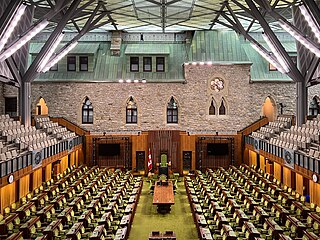The Christian Union is a Christian-democratic political party in the Netherlands. The CU is a centrist party, maintaining more progressive stances on economic, immigration and environmental issues while holding more socially conservative positions on issues such as abortion and euthanasia. The party describes itself as "social Christian".

The House of Commons of Canada is the lower house of the Parliament of Canada. Together with the Crown and the Senate of Canada, they comprise the bicameral legislature of Canada.

The Parliament of Canada is the federal legislature of Canada, seated at Parliament Hill in Ottawa, and is composed of three parts: the King, the Senate, and the House of Commons. By constitutional convention, the House of Commons is dominant, with the Senate rarely opposing its will. The Senate reviews legislation from a less partisan standpoint and may initiate certain bills. The monarch or his representative, normally the governor general, provides royal assent to make bills into law.

The Senate of Canada is the upper house of the Parliament of Canada. Together with the Crown and the House of Commons, they compose the bicameral legislature of Canada.
A private member's bill is a bill introduced into a legislature by a legislator who is not acting on behalf of the executive branch. The designation "private member's bill" is used in most Westminster system jurisdictions, in which a "private member" is any member of parliament (MP) who is not a member of the cabinet (executive). Other labels may be used for the concept in other parliamentary systems; for example, the label member's bill is used in the Scottish Parliament and the New Zealand Parliament, the term private senator's bill is used in the Australian Senate, and the term public bill is used in the Senate of Canada. In legislatures where the executive does not have the right of initiative, such as the United States Congress, the concept does not arise since bills are always introduced by legislators.

The Parliament of Finland is the unicameral and supreme legislature of Finland, founded on 9 May 1906. In accordance with the Constitution of Finland, sovereignty belongs to the people, and that power is vested in the Parliament. The Parliament consists of 200 members, 199 of whom are elected every four years from 13 multi-member districts electing 7 to 36 members using the proportional D'Hondt method. In addition, there is one member from Åland.

The New Zealand Parliament is the unicameral legislature of New Zealand, consisting of the Sovereign (King-in-Parliament) and the New Zealand House of Representatives. The King is usually represented by his governor-general. Before 1951, there was an upper chamber, the New Zealand Legislative Council. The New Zealand Parliament was established in 1854 and is one of the oldest continuously functioning legislatures in the world. It has met in Wellington, the capital of New Zealand, since 1865.

The Senate of Fiji was the upper chamber of Parliament. It was abolished by the 2013 Constitution of Fiji, after a series of military coups. It was the less powerful of the two chambers; it could not initiate legislation, but could amend or veto it. The Senate's powers over financial bills were more restricted: it could veto them in their entirety, but could not amend them. The House of Representatives could override a senatorial veto by passing the bill a second time in the parliamentary session immediately following the one in which it was rejected by the Senate, after a minimum period of six months. Amendments to the Constitution were excepted: the veto of the Senate was absolute. Following the passage of a bill by the House of Representatives, the Senate had 21 days to approve, amend, or reject it; if at the expiry of that period the Senate had done nothing about it, it was deemed to have passed the bill.

The Parliament of Malaysia is the national legislature of Malaysia, based on the Westminster system. The bicameral parliament consists of the Dewan Rakyat and the Dewan Negara. The Yang di-Pertuan Agong (King), as the head of state, is the third component of Parliament.

Youth Parliament of Manitoba Inc. (YPM) is a non-partisan, non-denominational, and incorporated registered charity based in Manitoba, Canada.

The British Columbia Youth Parliament (BCYP) is a youth service organization that operates in the guise of a "parliament" in the Canadian province of British Columbia. The BCYP fulfills its motto of "Youth Serving Youth" by means of "legislation" enacting community service projects and other youth-oriented activities. The BCYP is the successor to the Older Boys' Parliament of British Columbia, which first met in 1924.

The Western Canada Youth Parliament (WCYP) is a biennial event that brings together delegations from the British Columbia Youth Parliament (BCYP), the Alberta Youth Parliament, the Saskatchewan Youth Parliament (SYP) and the Youth Parliament of Manitoba (YPM) for a four-day parliamentary session, usually during the Victoria Day long weekend. The hosting for the WCYP rotates amongst these four youth parliaments. The members at each session of the WCYP debate resolutions in the form of legislation. The rules of parliamentary debate for each WCYP are those of the host province.
The Saskatchewan Youth Parliament (SYP) is a non-partisan organization of young people that meets to discuss and debate political and social issues. Members learn about the mechanics of government, such as parliamentary procedure, decision making, and the rules of debate in a parliamentary democracy. Additionally, members are exposed to a variety of viewpoints from youth from around Saskatchewan. At its annual Christmas session, SYP members are given the privilege of debating at the Saskatchewan Legislature in Regina, in the same seats as the real Members of the Legislative Assembly. SYP is run for youth by youth by a cabinet elected at the Annual Christmas Session each year. Cabinet does everything from planning the events, to finances and communications.
The Alberta Youth Parliament (AYP) is one of a number of provincial model youth parliaments that has its origins in the "boys work" movement of the nineteenth and early twentieth centuries. It is the oldest youth parliament in Alberta, and the longest continuously operating youth parliament in Canada. Its flagship session occurs every December in the Alberta Legislature, and it hosts a variety of smaller events throughout each year. It is open to all youths in Alberta who are between the ages of 15-21.

The Ontario Youth Parliament (OYP), formerly the Ontario Older Boys' Parliament, is one of a number of provincial youth model parliaments across Canada. Each year, the organization holds a four-day debate conference on Family Day weekend for youth ages 14 to 21 from Ontario, Canada. The organization has roots within the United Church of Canada dating back to 1907. The first session of the Older Boys' Parliament met in the Ontario Legislative Building at Queen's Park in Toronto in January 1925. As a result, the OYP, as successor to the Older Boys' Parliament, is one of the oldest youth parliaments in Canada. Gordon Lapp of Brighton served as the first Premier.

The Parlement jeunesse du Québec (PJQ) is one of a number of provincial youth parliaments across Canada. Each year, about a hundred of young participants, aged between 18 and 25, meet up in Quebec to discuss and debate like the real politicians. It aims to reproduce the functioning of the parliament of Quebec, the National Assembly of Quebec. Indeed, like the real parliament, the PJQ has its majority party that forms the government, led by the Premier, as well as the official opposition, led by the Leader of Opposition.

The Parliament of Grenada is composed of the monarch and two chambers: Senate and the House of Representatives. It operates from the New Parliament Building in St. George's.
A legislative session is the period of time in which a legislature, in both parliamentary and presidential systems, is convened for purpose of lawmaking, usually being one of two or more smaller divisions of the entire time between two elections. A session may last for the full term of the legislature or the term may consist of a number of sessions. These may be of fixed duration, such as a year, or may be determined by the party in power. In some countries, a session of the legislature is brought to an end by an official act of prorogation, in others by a motion to adjourn sine die. In either event, the close of a session generally brings an end to all unpassed bills in the legislature, which would have to be introduced anew to continue debate in the following session.
The Newfoundland and Labrador Youth Parliament (NLYP) is one of a number of provincial youth model parliaments across Canada.














